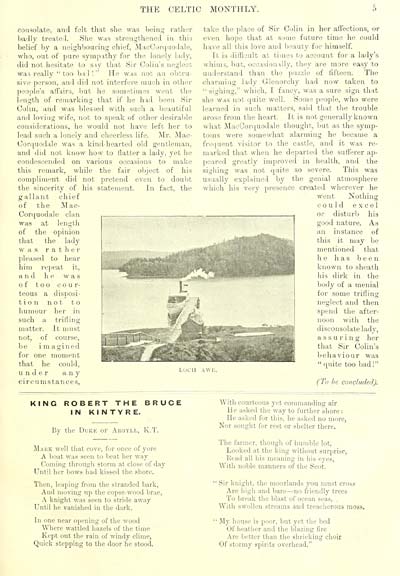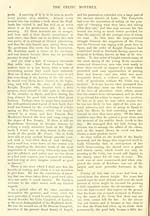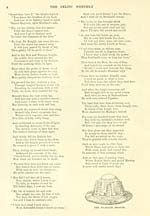Blair Collection > Celtic monthly > Volume 2, 1894
(17)
Download files
Complete book:
Individual page:
Thumbnail gallery: Grid view | List view

THE CELTIC MONTHLY.
cousolatR, and felt that she was beiii^ rathiu-
badly treateil. Slie was strengthened in this
belief by a neighbouring chief, MaeCorquoJale,
who, out of pure sympathy for the lonely lady,
did not hesitate to s ly that Sir Colin's neglect
was really " too b.il ! " He was not an obtru-
sive person, and did not interfere much in other
people's ati'urs, but he sometimes went the
length of remarking that if he had been Sir
Colin, and was blessed with such a beautiful
and loving wife, not to speak of other desirable
considerations, he would not have left her to
lead such a lonely and cheerless life. Mr. Mac-
Corquodale was a kind-hearted old gentleman,
and did not know how to flatter a lady, yet he
condescended on various occasions to make
this remark, while the fair object of his
compliment did not pretend even to doubt
the sincerity of his statement. In fact, the
gallant chief
of the Mac-
Corquodale clan
was at length
of the opinion
til at the lady
was rathe r
pleased to hear
him repeat it,
a n d li e was
of too c o u r-
teous a disposi-
tion not to
liumour her in
such a trilling
matter. It must
not, of course,
be imagined
for one moment
that he could,
under any
circumstances,
LOCH AWli.
take the place of Sir Colin in her affections, or
even hope that at some future time he could
have all this love and beauty for himself.
It is difficult at times to account for a lady's
whim-i, but, occasionally, they are more easy to
understand than the puzzle of fifteen. The
charming lady Glenorchy had now taken to
'• sighing," which, I fancy, was a sure sign that
she was not quite well. Some people, who were
learned in such matters, said that the trouble
arose from the heart. It is not generally known
what MacCorquodale thought, but as the symp-
toms were somewhat alarming he became a
frequent visitor to the castle, and it was re-
marked that nfhen he departed the sufferer ap-
jieared greatly improved in health, and the
sighing was not quite so severe. This was
usually explained by the genial atmosphere
which his very presence created wherever he
went Nothing
could excel
or disturb his
good nature. As
an instance of
this it may be
mentioned that
he has been
known to sheath
his dirk in the
body of a menial
for some trifling
neglect and then
spend the after-
noon with the
disconsolate lady,
assuring her
that Sir Colin's
beliaviour was
" quite too bad!"
(^7b be conchided).
KING ROBERT THE BRUCE
IN K I N T Y R E.
By the DiiKK OF AuQYLi,, IC.T.
MakK well that cove, fur once of yore
A boat was seen lo beat her way
Coming through storm at close of day
Until her bows had kissed the shore.
Then, leaping from the stranded bark.
And moving up the copse-wood brae,
A knight was seen to stride away
Until he vanished in the dark.
In one near opening of the wood
Where wattled hazels of the time
Kept out the rain of windy clime,
Quick stepping to the door he stood.
With courteous yet commanding air
He asked the way to further shore :
He asked for this, he asked no more,
Nor sought for rest or shelter there.
The farmer, though of humble lot,
Looked at the king without surprise,
Read all his meaning in his eyes.
With noble manners of the Scot.
' Sir knight, the moorlands you must cross
Are higli and bare — no friendly trees
To break the blast of ocean seas, ,
With swollen streams and treacherous moss.
' My house is poor, but yet the bed
Of heather and the blazing fire
Are bettor than the shrieking choir
Of stormy spirits overhead,"
cousolatR, and felt that she was beiii^ rathiu-
badly treateil. Slie was strengthened in this
belief by a neighbouring chief, MaeCorquoJale,
who, out of pure sympathy for the lonely lady,
did not hesitate to s ly that Sir Colin's neglect
was really " too b.il ! " He was not an obtru-
sive person, and did not interfere much in other
people's ati'urs, but he sometimes went the
length of remarking that if he had been Sir
Colin, and was blessed with such a beautiful
and loving wife, not to speak of other desirable
considerations, he would not have left her to
lead such a lonely and cheerless life. Mr. Mac-
Corquodale was a kind-hearted old gentleman,
and did not know how to flatter a lady, yet he
condescended on various occasions to make
this remark, while the fair object of his
compliment did not pretend even to doubt
the sincerity of his statement. In fact, the
gallant chief
of the Mac-
Corquodale clan
was at length
of the opinion
til at the lady
was rathe r
pleased to hear
him repeat it,
a n d li e was
of too c o u r-
teous a disposi-
tion not to
liumour her in
such a trilling
matter. It must
not, of course,
be imagined
for one moment
that he could,
under any
circumstances,
LOCH AWli.
take the place of Sir Colin in her affections, or
even hope that at some future time he could
have all this love and beauty for himself.
It is difficult at times to account for a lady's
whim-i, but, occasionally, they are more easy to
understand than the puzzle of fifteen. The
charming lady Glenorchy had now taken to
'• sighing," which, I fancy, was a sure sign that
she was not quite well. Some people, who were
learned in such matters, said that the trouble
arose from the heart. It is not generally known
what MacCorquodale thought, but as the symp-
toms were somewhat alarming he became a
frequent visitor to the castle, and it was re-
marked that nfhen he departed the sufferer ap-
jieared greatly improved in health, and the
sighing was not quite so severe. This was
usually explained by the genial atmosphere
which his very presence created wherever he
went Nothing
could excel
or disturb his
good nature. As
an instance of
this it may be
mentioned that
he has been
known to sheath
his dirk in the
body of a menial
for some trifling
neglect and then
spend the after-
noon with the
disconsolate lady,
assuring her
that Sir Colin's
beliaviour was
" quite too bad!"
(^7b be conchided).
KING ROBERT THE BRUCE
IN K I N T Y R E.
By the DiiKK OF AuQYLi,, IC.T.
MakK well that cove, fur once of yore
A boat was seen lo beat her way
Coming through storm at close of day
Until her bows had kissed the shore.
Then, leaping from the stranded bark.
And moving up the copse-wood brae,
A knight was seen to stride away
Until he vanished in the dark.
In one near opening of the wood
Where wattled hazels of the time
Kept out the rain of windy clime,
Quick stepping to the door he stood.
With courteous yet commanding air
He asked the way to further shore :
He asked for this, he asked no more,
Nor sought for rest or shelter there.
The farmer, though of humble lot,
Looked at the king without surprise,
Read all his meaning in his eyes.
With noble manners of the Scot.
' Sir knight, the moorlands you must cross
Are higli and bare — no friendly trees
To break the blast of ocean seas, ,
With swollen streams and treacherous moss.
' My house is poor, but yet the bed
Of heather and the blazing fire
Are bettor than the shrieking choir
Of stormy spirits overhead,"
Set display mode to: Large image | Transcription
Images and transcriptions on this page, including medium image downloads, may be used under the Creative Commons Attribution 4.0 International Licence unless otherwise stated. ![]()
| Early Gaelic Book Collections > Blair Collection > Celtic monthly > Volume 2, 1894 > (17) |
|---|
| Permanent URL | https://digital.nls.uk/75844087 |
|---|
| Shelfmark | Blair.55 |
|---|---|
| Additional NLS resources: | |
| Attribution and copyright: |
|
| Description | A selection of books from a collection of more than 500 titles, mostly on religious and literary topics. Also includes some material dealing with other Celtic languages and societies. Collection created towards the end of the 19th century by Lady Evelyn Stewart Murray. |
|---|
| Description | Selected items from five 'Special and Named Printed Collections'. Includes books in Gaelic and other Celtic languages, works about the Gaels, their languages, literature, culture and history. |
|---|

